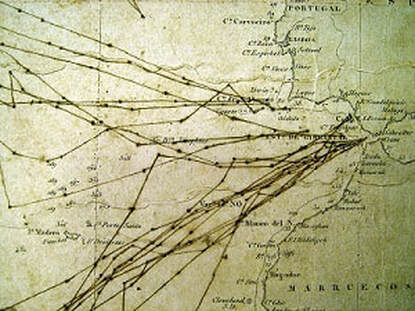Logs, Diaries, Journals
 Log
Log Remember “Captain’s Log, Star Date 190421...”? And so began another episode of the famous TV series. What is a log, anyway? Ships have logs. Airplanes have logs. Truckers have logs. Truckers haul logs.
The origins of the word log are unknown, possibly from Old Norse lag (felled tree) from liggja (to lie); hence a log is a tree that lies on the ground. Also, there are possible connections with Proto-Indo-European (PIE) legh (to lay oneself down). From legh comes Greek lechos (bed) and lochos (lair), German liegen, and the Old English word licgan (to lie down).
In any case, in its origins the word log appears related to the action of ‘laying something down’. The word log, meaning a piece of a tree or a lump of wood, does not appear in English until the early 14th century.
So, what does all this have to do with a log; i.e., a logbook?
The term log or logbook comes from the early days of sailing and navigation. To measure a ship’s speed, a piece of wood (or log) weighted at one end was ‘laid down’ vertically in the water. The top end of the ‘log’ was attached to a long ‘log line’ knotted at regular intervals. Once the log was in the water, a sailor counted the knots as they played out in relation to the time. Hence the nautical term ‘knot’ as a measurement of speed. To keep a record of your travel, you would write down (i.e., lay down) the speed and other details in the logbook.
This use of the term ‘logbook’ is from the 1670s; the shorter term ‘log’ is from 1842. The sense of a log as any record of facts entered in order is from 1913. The verb ‘to log’ (to enter information into a logbook) is from 1823. To ‘log in’ to a computer (or to ‘log off) is from 1963.
If you are still wondering, there is no apparent common origin for log as the act of ‘laying down’ and a log as a ‘fallen tree’. The fact that a log is a tree that is lying down does not indicate or prove any etymological connection.
Diary
Diary comes from Latin diarium meaning the record of a daily allowance; i.e., a per diem. Diarium and per diem come from Latin dies (day) and dietas (diety, divinity, divine). The origin of these words is PIE deiwos (god) and dei (to gleam, to shine). From these roots, we also get Latin deus (god) and Sanskrit deva (god).
So, a diary is a book in which you record the shining moments of each day; e.g., how much of your allowance you spent for food or on gas for the car!
Journal
Like diary, journal has its roots in Latin dies (day) and diurnalis (daily), and in PIE dei. From these roots, we also have the words diurnal (happening each day) and nocturnal (happening each night). In pre-medieval France diurnalis became journal (daily). From France, journal came to medieval England as the word for a book containing the forms of worship for each day.
In contrast to a diary, a journal became a record of one’s ‘interior’ events, a record of one’s thoughts, feelings, and other reflective browsings.
In brief…
A log is a book for laying down facts and details and information. A diary is a book for highlights, lowlights, aha moments. A diary records what happened and first thoughts and feelings about what happened. A journal is a book for reflection and drawing insights, implications, and next steps from what happened.
Reference: Online Etymological Dictionary, https://www.etymonline.com/
Published on July 01, 2021 14:39
No comments have been added yet.



